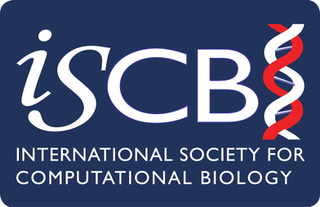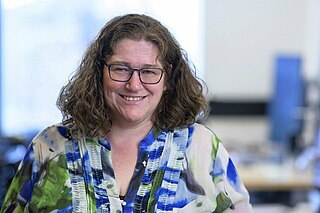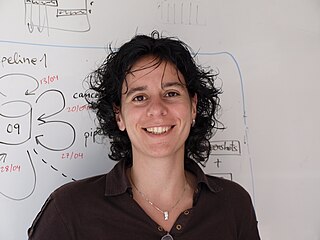
Daphne Koller is an Israeli-American computer scientist. She was a professor in the department of computer science at Stanford University and a MacArthur Foundation fellowship recipient. She is one of the founders of Coursera, an online education platform. Her general research area is artificial intelligence and its applications in the biomedical sciences. Koller was featured in a 2004 article by MIT Technology Review titled "10 Emerging Technologies That Will Change Your World" concerning the topic of Bayesian machine learning.

David Haussler is an American bioinformatician known for his work leading the team that assembled the first human genome sequence in the race to complete the Human Genome Project and subsequently for comparative genome analysis that deepens understanding the molecular function and evolution of the genome.

The International Society for Computational Biology (ISCB) is a scholarly society for researchers in computational biology and bioinformatics. The society was founded in 1997 to provide a stable financial home for the Intelligent Systems for Molecular Biology (ISMB) conference and has grown to become a larger society working towards advancing understanding of living systems through computation and for communicating scientific advances worldwide.

Lawrence E. Hunter is a Professor and Director of the Center for Computational Pharmacology and of the Computational Bioscience Program at the University of Colorado School of Medicine and Professor of Computer Science at the University of Colorado Boulder. He is an internationally known scholar, focused on computational biology, knowledge-driven extraction of information from the primary biomedical literature, the semantic integration of knowledge resources in molecular biology, and the use of knowledge in the analysis of high-throughput data, as well as for his foundational work in computational biology, which led to the genesis of the major professional organization in the field and two international conferences.
The ISCB Overton Prize is a computational biology prize awarded annually for outstanding accomplishment by a scientist in the early to mid stage of his or her career. Laureates have made significant contribution to the field of computational biology either through research, education, service, or a combination of the three.
The ISCB Accomplishment by a Senior Scientist Award is an annual prize awarded by the International Society for Computational Biology for contributions to the field of computational biology.
Trey Ideker is a professor of medicine and bioengineering at UC San Diego. He is the Director of the National Resource for Network Biology, the San Diego Center for Systems Biology, and the Cancer Cell Map Initiative. He uses genome-scale measurements to construct network models of cellular processes and disease.

Ron Shamir is an Israeli professor of computer science known for his work in graph theory and in computational biology. He holds the Raymond and Beverly Sackler Chair in Bioinformatics, and is the founder and former head of the Edmond J. Safra Center for Bioinformatics at Tel Aviv University.

Gary Stormo is an American geneticist and currently Joseph Erlanger Professor in the Department of Genetics and the Center for Genome Sciences and Systems Biology at Washington University School of Medicine in St Louis. He is considered one of the pioneers of bioinformatics and genomics. His research combines experimental and computational approaches in order to identify and predict regulatory sequences in DNA and RNA, and their contributions to the regulatory networks that control gene expression.

Dana Pe'er, Chair and Professor in Computational and Systems Biology Program at Sloan Kettering Institute is a researcher in computational systems biology. A Howard Hughes Medical Institute (HHMI) Investigator since 2021, she was previously a professor at Columbia Department of Biological Sciences. Pe'er's research focuses on understanding the organization, function and evolution of molecular networks, particularly how genetic variations alter the regulatory network and how these genetic variations can cause cancer.

Bonnie Anne Berger is an American mathematician and computer scientist, who works as the Simons professor of mathematics and professor of electrical engineering and computer science at the Massachusetts Institute of Technology. She is the head of the Computation and Biology group at MIT's Computer Science and Artificial Intelligence Laboratory. Her research interests are in algorithms, bioinformatics and computational molecular biology.

Anthony Rex Hunter is a British-American biologist who is a professor of biology at the Salk Institute for Biological Studies and the University of California San Diego. His research publications list his name as Tony Hunter.

Carl H. June is an American immunologist and oncologist. He is currently the Richard W. Vague Professor in Immunotherapy in the Department of Pathology and Laboratory Medicine at the Perelman School of Medicine of the University of Pennsylvania. He is most well known for his research on T cell therapies for the treatment of several forms of cancers. In 2020 he was elected to the American Philosophical Society.
The ISCB Innovator Award is a computational biology prize awarded annually to leading scientists who are within two decades post-degree, who consistently make outstanding contributions to the field, and who continue to forge new directions. The prize was established by the International Society for Computational Biology (ISCB) in 2016 and is awarded at the Intelligent Systems for Molecular Biology (ISMB) conference. The inaugural recipient was Serafim Batzoglou.

Núria López Bigas is a Spanish biologist and research professor with expertise in medical genetics, computational biology, and bioinformatics. She is an ICREA professor at Pompeu Fabra University and she also leads the Biomedical Genomics Research Group at the Institute for Research in Biomedicine in Barcelona, Spain. Her research is focused on developing computational approaches to investigate cancer genomes.
Mona Singh is an American computer scientist and an expert in computational molecular biology and bioinformatics. She is the Wang Family Professor in Computer Science in the Lewis-Sigler Institute for Integrative Genomics and the Department of Computer Science at Princeton University. Since 2021, she has been the Editor-in-Chief of the Journal of Computational Biology.

Hanah Margalit is a Professor in the faculty of medicine at the Hebrew University of Jerusalem. Her research combines bioinformatics, computational biology and systems biology, specifically in the fields of gene regulation in bacteria and eukaryotes.
Katherine Snowden Pollard is the Director of the Gladstone Institute of Data Science and Biotechnology and a professor at the University of California, San Francisco (UCSF). She is a Chan Zuckerberg Biohub Investigator. She was awarded Fellowship of the International Society for Computational Biology in 2020 and the American Institute for Medical and Biological Engineering in 2021 for outstanding contributions to computational biology and bioinformatics.

M. Madan Babu is an Indian-American computational biologist and bioinformatician. He is the endowed chair in biological data science and director of the center of excellence for data-driven discovery at St. Jude Children's Research Hospital. Previously, he served as a programme leader at the MRC Laboratory of Molecular Biology (LMB).

Frances I. Lewitter is a computational biologist and the founding director of the Whitehead Institute’s Bioinformatics and Research Computing (BaRC) program.














